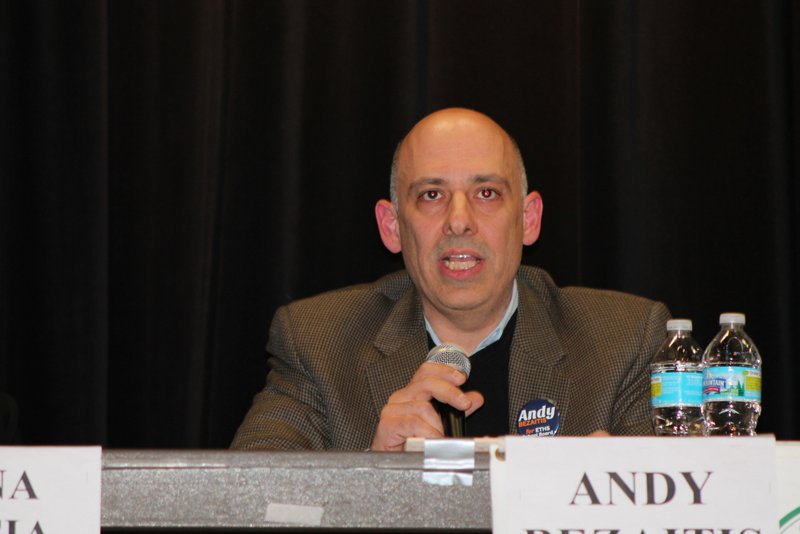Andy Bezaitis
 Central Street Neighbors Association School Board Questionnaire
Central Street Neighbors Association School Board Questionnaire
Candidate for: District 202
Voting address:
1208 Judson Ave.
Years lived in school district:
Raised in Skokie/Evanston from 1970 - 1990; moved back to Evanston with family in 2010; ETHS Class of 1984
Campaign website: andybezaitis202.com
Campaign phone: 773-405-0746
E-mail address: andy202@bezaitis.com
Other websites on which you post campaign statements or positions:
Facebook page: Andy Bezaitis 202
Campaign Chair: Andy Bezaitis
Treasurer: Brian Heckler
Campaign manager or consultant(s): committee include: Tom and Dana Bush, Jennifer Coyne, Brian Heckler and Coley Gallagher, Lori Keenan, Cheryl Lulias, Peter O’Brien, David Porter, Marcia Mahoney, Regina Wooton
Elective or appointive public or party offices previously held including dates:
None
What is your primary occupation?
Chief Operating Officer, CellTrak, Inc.
Breifly list your past civic activities. If numerous list here the five most relevant:
-
Co-taught Lincoln School Math Olympiad
-
Evanston 150 The More You Know member
-
PTA member, Lincoln, Dewey & Nichols schools
-
AYSO soccer coach
-
Team Evanston Team Parent
What subjects have you studied and what experience have you had which will be most helpful to you as you serve on the school board?
I am a graduate of Timber Ridge Elementary School, Chute Middle School and Evanston Township High School. ETHS was transformative for me. As the son of immigrant parents who valued education and moved to Skokie-Evanston so their children could go to ETHS, I benefitted immensely from all ETHS had to offer, and found my way to a successful life with the guidance and support of my excellent teachers. I am committed to ensuring that all Evanston children have the same opportunity for inspiration, challenge and enrichment.
After graduation from ETHS I attended Carnegie Mellon University where I obtained a BS in Electrical Engineering. I then obtained a Master of Science degree in electrical engineering from IIT, and an MBA from the University of Chicago. For the last 20 years I have managed organizations in the technology, healthcare and education fields. I have been responsible for strategic planning and achievement of measurable results, including restructuring and realignment. I have seen the benefits of a transparent process, including goal setting, data evaluation and results-oriented focus.
Because of my technology background, I am a firm believer in the importance of technological resources for ETHS. Not just for STEM (science, technology, education and math), but for its creative use in the humanities (English, history and sociology), communication (creation of pictorial, journalistic, video and audio content for digital dissemination), and the arts (theater, music and visual.
Please list all endorsements you have received so far. You may also use this space if desired to indicate what you consider to be your principal base(s) of support and why you want voters to consider your endorsements or support base.
My supporters are Evanstonians who are focused on the importance of ETHS and excellence in education to this community and all of its students. They including fellow alumni, people I have metthrough my attendance at District 65 and 202 board meetings, fellow parents and teachers involved with the PTAs at Lincoln, Dewey and Nichols schools and community members I worked with through the Evanston 150 The More You Know group;
(CSNA Note: Andy provided a list of supporters which is also available on his campaign website:
http://www.andybezaitis202.com/supporters/ )
Essence of Campaign. Briefly, why are you running and why should a voter give you one of his or her votes? How will electing you make a difference?
I am a candidate for the District 202 Board because I believe ETHS is the most critical institution in Evanston. The quality of the ETHS educational and extracurricular experience matters immensely for our children and our community. ETHS changed my life, and I am committed to ensuring that all Evanston children have the same opportunities I did by finding teachers, counselors, coaches and mentors who will guide them to a successful future. In addition, my career in the technology industry provides me with a unique perspective and voice for the Board. To District 202 I bring: 1) passion for ETHS, my alma mater; 2) management experience (strategic planning, budget development and oversight, goal-setting and analysis of results); and 3) a deep understanding of the impact that technology can have on our children’s education and will have on their future.
Educational philosophy. American education, and sometimes that in Evanston, is variously criticized as culturally biased in favor of dominant or privileged classes or groups and their culture, as too relativistic, as too coddling and mushy, as failing to prepare students for the 21st century economy, or as failing to teach basics, among others. What principal deficit(s) in American or Evanston education do you see, and what will you do as a local Board member to address this?
We must demand that our children are engaged as individuals and not as groups. Each student walks into ETHS with his or her own set of strengths, weaknesses, interests, motivations, character, home and personal life, ambitions and awareness. Thus, academic and extracurricular guidance, programs, and rigor must be personalized for each child, so that each leaves ETHS prepared for the challenges they will face – in college, the workforce, and in the communities in which they will live. Because each child is unique, I do not believe in academic silver bullets. Academic fundamentals are important, as are electives. We need an educational system that tailors to individuals. On the District 202 Board I will work to ensure that our children have options so that they, with their parents, teachers, counselors and mentors, can craft the academic experience that fits their needs, interests and capabilities. The Career and Technical Education is a fantastic example of choice. I support choice in all facets and insist that appropriate levels of rigor be part of that choice. All of these choice possibilities must be balanced with the regulatory environment and common core standards. While I believe standards often help provide a predictable framework for students,
teachers and administrators, it reduces the possibilities for teachers to explore unique interests and also makes it difficult for teachers to work with students on the edges of the classroom performance . This is particularly compounded by teacher evaluations that are only outcome and performance based. We must work to find the proper balance in these tradeoffs. The board must work with the administration to ensure the options and effectiveness are present and effectively executed through the goals/measures function of a school board.
Superintendent. If elected this April, during your tenure you will have one or more opportunities to fire, hire, or extend the contract of a superintendent. What specific criteria, if any, including any quantitative performance criteria, will you use in your decision?
I believe the Board should annually give the superintendant clear, itemized, measurable performance objectives that are tied directly to the goals set forth in the District’s 2012-2015 strategic plan. He should then be evaluated based on his performance of those objectives. I also would support a 360- degree process of review for the superintendent, including input from the District 202 Board, subordinate administrators, teachers and students. As we move toward increased collaboration with District 65, metrics to evaluate collaboration also should be part of the performance evaluation. This partnership is a critical effort in creating a seamless transition for every student.
Expenditures. District 202's most recent posted total budget for all funds is over $72 million – which is over $23,000 per student. District median household income is less than $65,000. Is the current expenditure level necessary and sustainable?
I believe District 65 and 202 must work together and work with other community partners to give taxpayers a better return on their investment in our schools. ETHS alone cannot fix achievement gap for children in grades 9 – 12 regardless of the amount of money it spends per student. We, as a community, must consider the impact of early/preschool, elementary and middle school education on high school performance, and work together to provide necessary support so all our children can succeed. Given the challenges our children face and the reality of escalating pension and other benefit costs, I believe the current level of expenditure for District 65 and 202 will be necessary during my term. It is my hope that by working together the two districts will be able to achieve economies through collaborative administration and planning, so that additional funds can be repurposed to costs that directly affect our children’s educational experience – teachers, counselors, coaches, mentors and technology.
Tracking. State succinctly and specifically what ETHS should be doing the same, more of, or differently with respect to differentiated or mixed-level instruction, tracking, and the honors program, and why.
I believe in data and results. I also believe that change can be iterative – an organization must learn from its experience, replicating the successful components of an idea or program and modifying those that were not successful. As a Board Member I would apply these core beliefs to the tracking issue. Tracking is premised on the proposition that teachers are most effective with a narrow band of students - they can focus their time and attention within a narrow band so the students receive tailored instruction and curriculum. ETHS “de-tracked,” hoping to resolve issues caused by tracking: bias in placement, lack of uniformity in rigor, and a disproportionate impact on minority and low-income children. These are important issues for our children and our community, and I applaud the Board and administration for devising a plan to address them although I am not supportive of the selection process and resulting methodology to address these issues. However, before continuing or expanding the plan, it is time for the Board to measure its success or lack of sucess, and also to determine whether it caused any unintended consequences. Thus, I fully support the District 202 Board’s decision to hire a consultant to independently evaluate the ETHS “de-tracking” initiative. Before extending it the Board must know, based on test scores, grades AND an independent survey of teachers, parents and students: Did detracking successfully resolve the issues it was intended to address? Did it cause had any unintended, negative consequences? Depending on the answer to these questions the Board must determine whether to continue or modify the de-tracking initiative, or abandon it in favor of another solution.
Cost Shifting. What should the district be doing to prepare for the possibility that some or all costs of pension financing will be shifted to suburban and downstate districts, as they are for Chicago schools?
I applaud the efforts of the Districts to engage our state representatives on this issue via the Joint Task Force. We need to continue and expand our communication and lobbying efforts, including providing clear information to Evanston families and taxpayers so they understand the status of State proposals. This is the # 1 financial risk for ETHS, Evanston, and the State and requires significant engagement to manage. The range of potential exposure is significant and can have a dramatic effect on the operating budget of our High School. Fundamentally, as a state, we have a major problem with outstanding liabilities and are in dire need of pension reform – but cost shifting of school district pensions is only one piece of the comprehensive reform that is necessary to get our state back on solid financial footing. The District should be an active and engaged participant in setting pension eligibility requirements which are currently handled by the state. How can ETHS be held accountable for paying for pensions when it is not also in the position to manage these eligibility and related commitments? The pension dilemma is very serious and not the fault of our community. We must be vigilant in limiting the financial obligations created by the failure of our state leadership in this area.
- Printer-friendly version
- Log in to post comments

